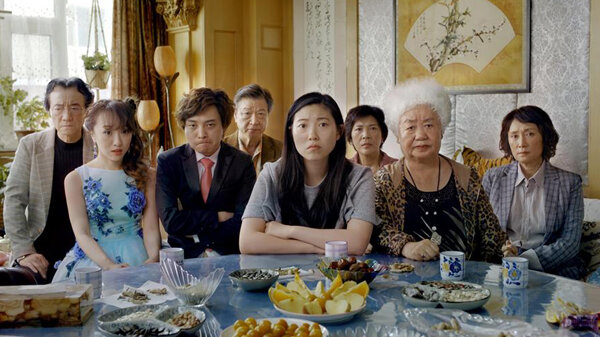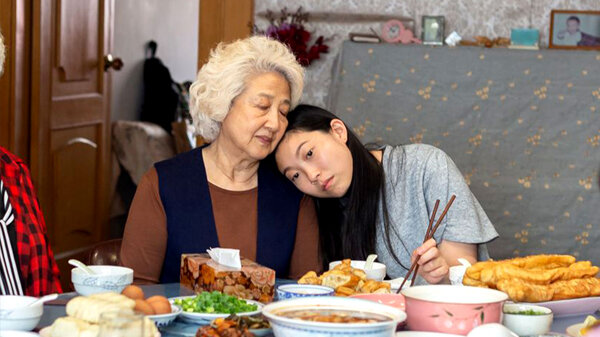To celebrate the UK release of Lulu Wang’s introspective second feature, Ava Wong Davies reflects on the duality of an identity lived between two cultures, and the performance of love it entails.
I learned recently that the first language I could speak was Cantonese.
“When you were playing with your toys you would babble away in Chinese,” my mother told me one night, eyes fixed on her phone. “You only learned how to speak English later on.”
“What happened?” I asked, chopsticks laid to rest.
“I don’t know. You forgot it when you went to school.”
I was born in London in 1996 to a Chinese mother and Welsh father. My mother has four siblings – Mimi, Olivia, Clara, and Bobby – who live in Singapore, Kuala Lumpur, and Hong Kong. Her mother – my Popo, my only living grandparent – also lives in Kuala Lumpur. My Gung Gung died in 2003, when I was 7. I never really knew my father’s parents – only through the curling sepia photos at the side of his bed.
When my Chinese family speak in Cantonese over the dinner table, I can understand most of it on some strange muscle memory, but I cannot speak it. The thought will not match my throat. I open my mouth and the language slips away like smoke. It is so utterly strange to be able to understand what my family are saying, but not be able to respond. And I can feel it slipping away from me. One day, I realised, after my Popo has passed away, I won’t be able to understand anymore.
“Based on an actual lie”, reads the now infamous title card at the beginning of Lulu Wang’s The Farewell In 2013, Wang’s Nai Nai (her paternal grandmother) was diagnosed with incurable lung cancer and given three months to live. Her family decided not to tell her. “It is our duty to carry the emotional burden for her,” they say in the film. Instead, in order to allow the extended family to say goodbye to her, they quickly mock up a wedding between her grandson and his new girlfriend.
A few white critics have, perhaps inevitably, been unable to move past the apparent absurdity of the story in favour of its aching humanity, calling it an “improbable sitcom premise,” coolly accepting that “the ruse seems plausible in this context,” and failing to take onboard perhaps its most acute lesson – to allow for simultaneity, to transcend binaries, to let two apparently oppositional things exist at once. The absurdity, after all, is what makes it utterly human. One informs the other.
When I spoke with Lulu Wang, we talked at length about balance. Balance in The Farewell doesn’t mean flatness – the film is full of movement, full of life – rather, it means that everything is precisely matched. It contrasts long, static quietness with swirling movement and life, which churns in and out of frame. It delicately mixes humour and tragedy, neither overwhelming the other. It walks a tightrope between honesty and kindness and lies. It contrasts the chaos and colour of the family against the still, pale face of Billi, Wang’s stand-in, played by Nora Lum (aka Awkwafina).
Lum is extraordinary – Wang has spoken about how she was cast because of her ability to hold a pause – and you can see the myriad of emotions drifting over her face, rippling like water over rocks as she silently tries to make sense of her family’s decision and her beloved Nai Nai’s (a glorious Zhao Shuzhen) impending death. She straddles China and America, truth and lies, childhood and adulthood, never fully connected to one or the other. In another film, she could be a cliched second-generation immigrant, ungrateful for her parents’ sacrifice and indulgently seeking self-actualisation, but Wang pulls away from that, remaining resolutely non judgemental. Long takes are focused on Billi’s face, allowing for her reactions to play out in full. The camera doesn’t shut down Billi’s responses, but allows them to breathe and expand. It’s remarkably generous. She moves through the film like an unmoored boat, body curved into itself. She seeks one answer at a time – which is home, China or America? Which is correct – telling the truth or keeping up the lie? – until she is finally able to see both, accept all.
*
You can see simultaneity in The Farewell’s aspect ratio – the way a wider frame allows for a more expansive, more empathetic shot, so that the camera can show “this landscape of family.” When Billi apprehensively approaches her Nai Nai’s dinner table after arriving in Changchun, the camera encompasses every member of her family in a single frame. You see Nai Nai’s blissfully happy face turn to us first, dead centre, and then your gaze fans out, seeing the anxious, pale faces framing her. Nai Nai is cocooned in the shot by her family’s concern. Again, it’s indicative of Wang’s generosity as a storyteller, in her understanding that the wider the frame, the more humanity there is to capture at every moment - be it ugly or beautiful, bizarre or profound, or all at once. “Sometimes there’s something happening in the foreground,” she told me, “But there’s something ridiculous happening in the background. And the audience can choose, but you can feel both.”
*
I cried twice in The Farewell. Spectacularly, both times. Once, when Billi says goodbye to Nai Nai. It reminds me of saying goodbye to my Po Tai (maternal great-grandmother) at Kuala Lumpur airport when I was little, of the way she would weep quietly as we went down the escalators, frail bird-hands clutching onto my Popo’s sleeve, Popo stroking her downy white hair. “Why is she crying?” I would ask my mother. “She thinks this will be the last time she sees you,” she replied. In the press screening, 15 years later, I cram my fist into my mouth to muffle the sobs.
The second is when Billi, sitting on the floor in a dressing room as her cousin-to-be gets dressed for her wedding, speaks to her mother. For the first time, she begins to cry. She has been pleaded by her family to not cry. If she cries, then Nai Nai will realise something is wrong. In an astonishing, aching monologue, Billi speaks, almost to herself, about the last time she saw her Ye Ye (grandfather), before he passed away from cancer. “You never told me what was going on,” she murmurs to her mother through tears. When Nai Nai dies, what will be left for Billi? Who will she be? America is home, but not home. China is home, but not home. Neither quite fits, but neither is totally wrong, either. You watch her, slouched over, legs crossed like a child, weeping almost silently, unable to hold the two planets within her body.
America to China is a sharp contrast in The Farewell, and it jars, as it should, but it also provides a strange sense of steadiness. They are counterweights, and they swing violently within Billi, incurring in her a kind of seasickness, but occasionally there is a moment of glorious suspension. When Nai Nai does her daily exercises, she thrusts her hands out violently, poker straight, and barks. “Ha! Ha!” Billi tries to copy her, arms flailing out, shoulders still curved, and Nai Nai corrects her, tells her to take it seriously. Billi clowns about, Nai Nai laughs. They do it together. “Ha! Ha!” The sound is an equaliser - it clears the air. It’s an exhalation, an exorcism, an assertion. All three.
*
The Farewell is steeped in the art of performance. When in New York, the camera prowls around, tracking Billi fluidly, but as soon as she arrives in Changchun, it becomes more still, more static, more staged. It’s no coincidence that there are multiple dinner sequences throughout the film - after all, the awkward family meal where long-buried tensions come to fruition is a classic hallmark of theatre. “We wanted to show the theatricality of the situation,” Wang told me. “The family is performing, and it’s not real.” It’s not real, but it is real. Both can be true. There is an honesty to their performances, which is what makes The Farewell so painful and tender. Because the love in the lie is real. Does that really make it a lie?
There is a word which gets flung around my family: guai. Roughly translated, when referring to a child it means obedient, or filial. If I give Popo my arm to help her down the stairs, if I help clear the table after dinner, if I connect my Mum’s TV to Netflix for her – “Ho guai,” comes the purr. It’s a running joke between my siblings – “I’m picking Ma up from the doctor today” – “Wah, so guai”. You perform being guai, but it comes from love in its most ineffable state. Love is obligation, and love is performed, and that doesn’t make it unreal. But it does make it difficult. “You think one’s life belongs to oneself,” Billi’s uncle admonishes her. “But that is the difference between East and West.” “Family comes first,” is a constant refrain in my mother’s house. To love your Asian family is a process of expansion, an experiment in porousness, an active decentering of the self.
Ava Wong Davies (@avawongdavies) is a theatre critic and playwright from London.
Our LULU WANG t-shirt is available to purchase here. Proceeds go towards paying our writers and supporting female-led film projects.



